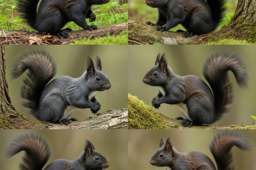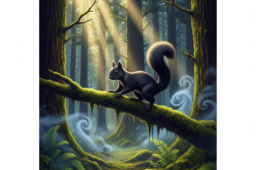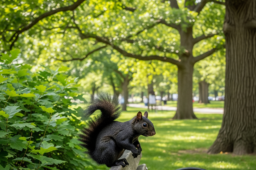Are Black Squirrels Aggressive? Debunking the Myths About Their Behavior
- July 20, 2025
- by
- John Miller
So, we know where to find them and we know why they’re black. But there’s another layer to the black squirrel mystery, one that’s full of whispers and playground rumors. Are they… different?
You’ve probably heard it before. Maybe someone at the park said, “Watch out for the black ones, they’re the bullies.” Or perhaps you’ve wondered if their bold, black coat comes with an equally bold and aggressive personality. It’s a common belief that black squirrels are the tough guys of the squirrel world, chasing away the grey ones and ruling the bird feeder with an iron paw.
But how much of that is actually true?
Today, we’re playing myth-busters. We’ll dive into the real behavior of black squirrels, look at what they actually eat, and find out if they truly are the little aggressors people make them out to be.
The Big Question: Are They More Aggressive?
Let’s get straight to the point. No, black squirrels are not naturally more aggressive than grey squirrels.
It’s the most common myth out there, but it has no basis in their biology. Remember, a black squirrel is just a grey squirrel with a different hair color. They are the exact same species (Sciurus carolinensis). They don’t have any special “aggressive” genes that come along with their black fur.
So why does the myth persist? There are a couple of psychological reasons:
- They Stand Out: Their jet-black color is striking. When a chase happens at a busy bird feeder, your eyes are naturally drawn to the more dramatic-looking animal. If a black squirrel chases a grey one, you notice it and remember it. If a grey one chases another grey one, it just looks like a normal squirrel squabble and you don’t think twice.
- A Survival Edge: In some situations, a black squirrel might seem more “confident” or “bold,” but this isn’t aggression. Research has suggested that the same gene responsible for their black fur might also play a role in stress responses, potentially making them slightly bolder. More importantly, their superior ability to retain heat in cold climates means they are often more energetic and active during winter, which can be mistaken for aggression. A well-fed, warm squirrel is simply more likely to stand its ground for a tasty peanut!
Do Black Squirrels Attack or Kill Grey Squirrels?
This is the darker side of the myth, and it’s also false. Black squirrels do not hunt, attack, or wage war on their grey-furred family members.
You will absolutely see them chasing each other. But this is standard squirrel behavior for all colors! They chase each other for a variety of reasons that have nothing to do with their fur:
- Territory: “This is my oak tree! Go find your own!”
- Food: “I saw that acorn first!”
- Mating: A male chasing a female is a key part of their courtship ritual.
- Play: Young squirrels, just like puppies, chase each other for fun and practice.
The competition you see is just that—competition. It’s not a color-based turf war.
So What Do Black Squirrels Eat?
Just like their behavior, their diet is identical to that of a grey squirrel. They are primarily herbivores and are not picky eaters. Their typical menu includes:
- Nuts: Acorns, walnuts, hickory nuts, and beechnuts are their absolute favorites. They are master “scatter-hoarders,” burying thousands of nuts each fall to retrieve later.
- Seeds: They love seeds of all kinds, especially sunflower seeds and corn from bird feeders (much to the annoyance of bird lovers!).
- Buds and Flowers: In the spring, when nuts are scarce, they’ll happily munch on tree buds and flowers.
- Fungi and Mushrooms: They will dig up and eat various types of fungi.
- Occasional Treats: While rare, they are opportunistic. They might occasionally eat an insect, a snail, or even a bird’s egg if they are very hungry and the opportunity arises.
They do not, however, have a diet based on hunting other animals.
Conclusion: Judge the Squirrel, Not the Coat
At the end of the day, a squirrel’s personality comes down to the individual, not its color. Some are timid, some are bold. Some will run from you, and others will run right up to your shoe hoping for a snack.
The idea of the “aggressive black squirrel” is a classic example of how a striking appearance can lead to false assumptions. They are simply grey squirrels wearing a different outfit, dealing with the same daily struggles for food, shelter, and survival. So next time you see one, you can admire it for its beauty without worrying that it’s the neighborhood troublemaker.
Frequently Asked Questions (FAQs)
A1: Their friendliness varies by individual squirrel and how accustomed they are to people. In urban parks and on college campuses where they are fed often, black squirrels can become very bold and friendly. In the wild, they are as naturally shy as any other squirrel.
A2: They get along as well as any two squirrels would—sometimes they compete, sometimes they ignore each other. Since they are the same species, they can and do mate with each other. It’s not uncommon to see a grey squirrel mother with a litter that includes both grey and black babies.
A3: Their predators are the same as for grey squirrels. In the wild, their main threats are hawks, owls, eagles, and foxes. In urban and suburban areas, their biggest threats are cars, domestic cats, and dogs.
Now that you know how they behave, have you ever wondered what it means when one shows up in your life? Explore the powerful spiritual meaning of black squirrels in our next guide!



